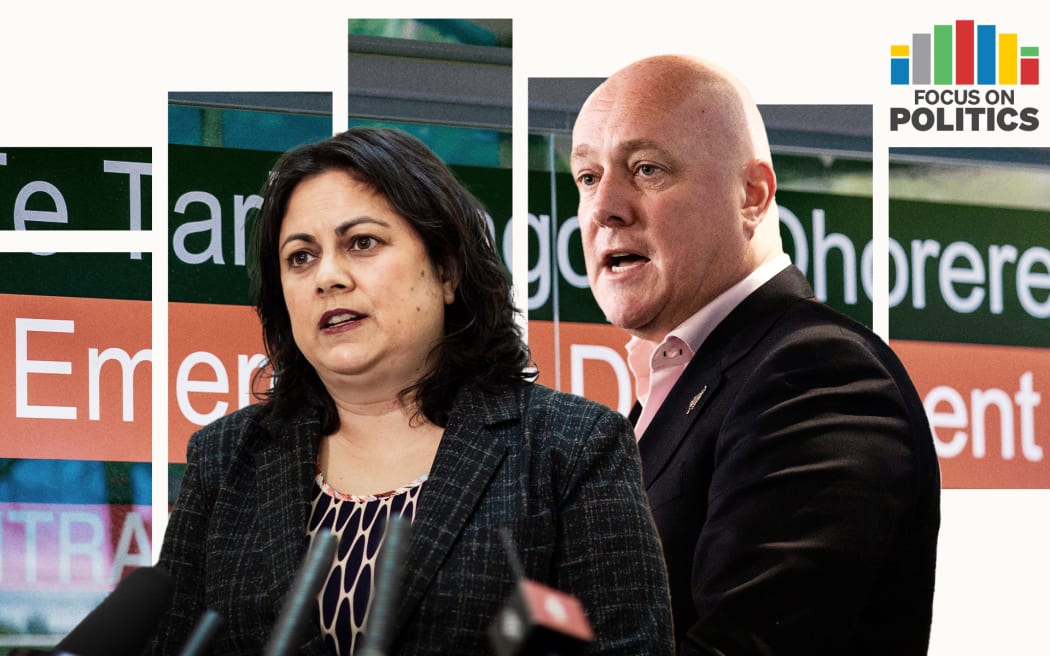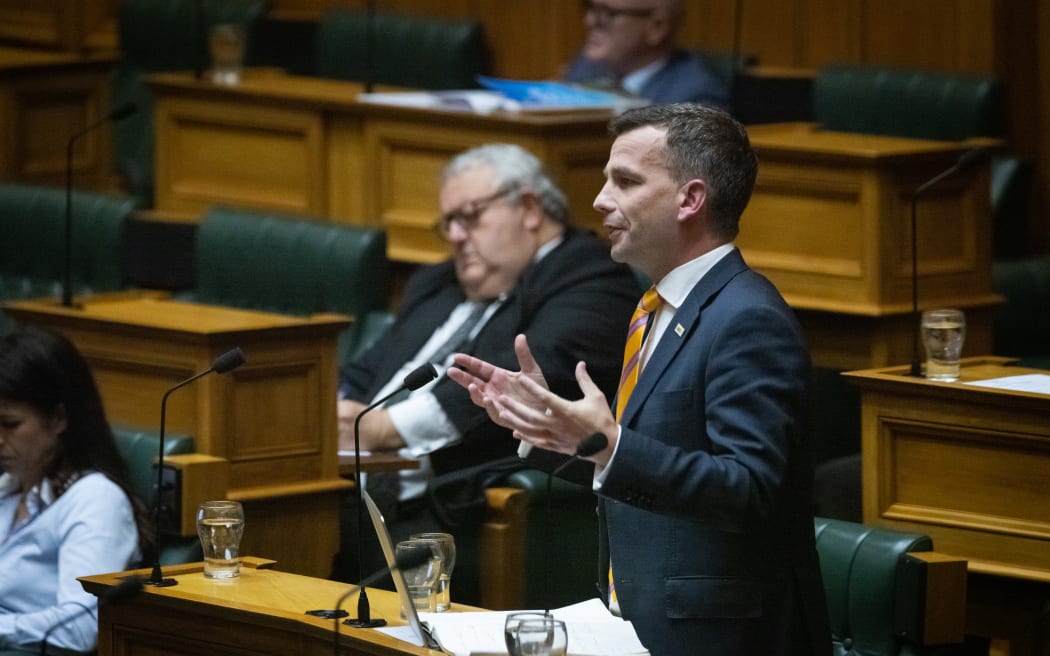
Health Minister Ayesha Verrall, and opposition leader Christopher Luxon. Photo: RNZ
"I think the main issue there is it's an election year and they want to get votes. I mean, the data is clear," - Dr John Mutu-Grigg
Politicians went head to head on health equity this week, with opposition parties making a concerted effort to paint a waitlist prioritisation tool as discriminatory.
With accusations flying from both sides of the House, an expert says the clinician-designed tool is in fact a way of correcting bias in the health system, and politicians are just looking for votes.
The National and ACT parties seized on a Newstalk ZB article published on Monday with the headline "Auckland surgeons must now consider ethnicity in prioritising patients for operations - some are not happy".
It centred on an algorithm introduced in Auckland in February which helps decide the order in which people receive non-urgent surgery, using five factors: clinical priority, time on the waitlist, geographic location, deprivation level, and ethnicity. "Several surgeons" were upset by it, the article said, quoting one unnamed male who was "disgusted" ethnicity was being considered.
Accounting for ethnicity as a risk factor in healthcare is not new. In fact, the now-contentious algorithm introduced in February was an update to one put in place in Auckland during the lockdowns. The earlier version only had two measures - one of which was ethnicity - so in reality the new one is de-emphasising ethnicity by including other factors.
National Party health spokesperson Shane Reti the next day told reporters he knew a number of clinicians were deeply unhappy with the system, and he shared their concerns.
"For surgical waiting lists, clinical decision-making should only be based on health need. That is the issue I've got, that is the issue clinicians have raised, and I agree with them."

Dr Shane Reti, who was a Northland GP before he got into politics. Photo: RNZ / Samuel Rillstone
He acknowledged, however, that factors like deprivation and time waited seemed reasonable.
His leader Christopher Luxon was around the corridor at the time, arguing "health need" was the only consideration. He said he did not care the measure had been designed by clinicians, and on being told the Royal Australasian College of Surgeons supported the tool, said it was just a difference of opinion.
ACT leader David Seymour (Ngāpuhi) brought the matter to the debating chamber later that day, fumbling an attempt to question Prime Minister Chris Hipkins on it in te reo Māori. "I am a Māori for health contexts," his translated words said, but Speaker Adrian Rurawhe responded: "I am also a Māori and that is not a question".

David Seymour in Parliament (file photo). Photo: VNP / Phil Smith
Seymour's caucus soon backed him up, his MPs firing questions (in English) at Hipkins about whether he found it acceptable that people with otherwise similar circumstances would wait longer for surgery because they were not Māori or Pasifika.
"There is clear evidence that if someone is Māori, if someone is a Pacific Islander, if they are from a rural community, or if they are from a low-income background, they have been languishing for longer on the waitlists than people who don't fit those descriptors," Hipkins responded.
As the debate continued, Green and Māori party leaders asked Rurawhe to step in, arguing the effect of ACT's questions was "absolutely intended to raise racist opinions amongst the New Zealand public".
Green Party co-leader Marama Davidson was ejected from the chamber for that accusation for breaching Parliament rules.
Read more:
- Opposition parties accused of racism over health equity claims
- The Detail: The waitlist algorithm that morphed into a political weapon
- Māori, Pasifika describe racist encounters in health sector
- How racism still shadows cancer diagnosis, treatment and outcomes
- Sick to death: Why the New Zealand health system is still failing Māori
- Māori health inequities cost $863m a year - study
Reti, Luxon and Seymour continued to argue the health system's disparities could not be explained by ethnicity alone, and accounting for other factors - like deprivation, housing and location - could make up the difference.
However, years of research and data suggests that's simply not the case. Health Minister Ayesha Verrall says there's plenty of evidence of racial bias in the health system.
"I think there is extensive evidence that there is bias, for example there is evidence that Māori with the same heart condition will get fewer medicines prescribed to them than a Pākehā," she says.
Orthopaedic surgeon Dr John Mutu-Grigg - chair of the Māori Health Advisory Group of the Royal Australasian College of Surgeons - explains that ethnicity is an independent risk factor - that is, even if you take these other factors into account, merely being a Māori or Pacific Islander means you are at higher risk.

Dr John Mutu-Grigg, an Auckland-based orthopaedic surgeon and chair of Royal Australasian College of Surgeons' Māori Health Advisory group. Photo: Supplied
"In the ideal world, I'm sure that everybody would agree that ethnicity should not be an independent risk factor. Unfortunately, that's not how risk factors work," he says. "There are certain groups that are less likely to be referred the tests, they are less likely to be have various investigations, they are less likely to be offered surgery, and when they do come to surgery, they usually have worse disease, they have worse post-operative outcomes, and they have higher mortality because of it."
He points to breast cancer as one of many examples: "If you are Māori, you're going to have worse outcome scores and less surgery, irrespective of how much income that you earn."
Dr Mutu-Grigg says he had no hand in designing the Auckland algorithm - and as far as he knows, no Māori surgeon did either. It was put together by a multi-disciplinary team who wanted to balance disadvantages out after a Medical Journal report in 2019 found Māori and Pacific people live seven and six years shorter, on average, than other ethnicities in New Zealand.
It found about half of Māori and Pacific deaths are potentially avoidable, compared to just 23 percent for others. For Māori, coronary disease and cancers of the airways and lungs in both males and females were significant contributors to early deaths. In Māori men, suicide and road accidents were a key factor in avoidable injuries. For Pacific men and women, the greatest contributors to early death were coronary disease, diabetes and strokes. Pacific women also had higher rates of uterine cancer contributing to shorter life spans.
Dr Mutu-Grigg says there is some disagreement within the sector but the data is clear, and anyone who can't see that - including the unnamed surgeon in Newstalk ZB's article - must be ignorant, racist, or both.
"I believe that if those surgeons just looked at the data, if they read the data that is available everywhere now, that we wouldn't be having this discussion," he says.
He's not surprised by the way the discussion has developed, however.
"The othering, the racial inequities, the treatment that you get right from high school, medical school, health, surgeons, registrar - it's been this way the whole time," he says. "No, it doesn't really surprise me and I'd like to say it upsets me but it doesn't really, it just makes me sad."
It's particularly unsurprising in an election year, he suggests.
"I think the main issue there is it's an election year and they want to get votes. I mean, the data is clear.
"It doesn't matter which opposition party it is and which big party's in government: the party that is not will always be saying the negative things about how everything is bad without actually looking at the data - because the data doesn't necessarily correspond with your argument - and I think that's the biggest issue."
He says even in an election year, health decisions should be left to the professionals, and the approach taken in Auckland means cheaper healthcare - for everybody.
"It's expensive to step in late, it's expensive to have ambulance at the bottom of the cliff. So it is much more efficient if we take people that are going to have worse scores, are doing worse to begin with, and that treating them earlier - that is going to be cheaper for the whole country."
Labour is clearly nervous about a backlash to measures like the 'Equity Adjustor Score'. The programme has been put on ice as the health minister tasks officials to check the pendulum has not swung too far the other way.
The tool's future - and whether it gets rolled out nationwide - will show whether the government has the appetite to back something most health professionals want, regardless of political risk.
In this week's Focus on Politics, Political Reporter Anneke Smith examines how ethnicity is a factor in health, and how that spilled into politics this week.
Listen free to Focus on Politics on Apple Podcasts, on Spotify, on iHeart Radio or wherever you get your podcasts.


